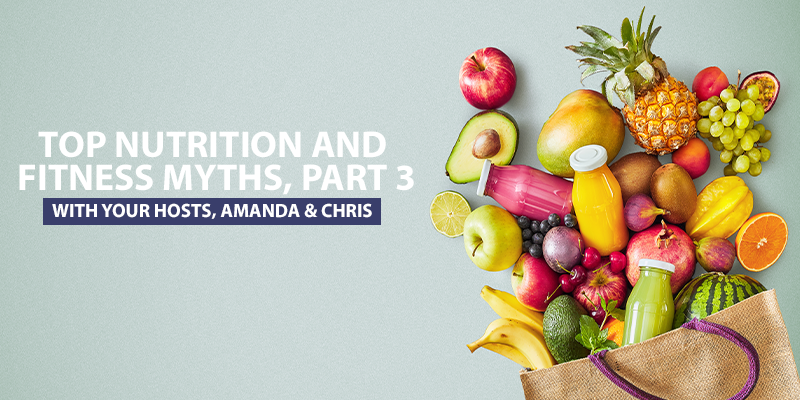
Episode 59: Top Nutrition and Fitness Myths, Part 3
Show Notes
With the amount of conflicting health-related information out there, it can be difficult to navigate what’s what when it comes to nutrition. That’s why in this episode, we’re breaking down the truth behind more common health myths.
In this episode you’ll learn:
-About the fresh vs frozen produce debate
-Different factors that play into the nutritional value of certain vegetables when fresh vs frozen
-How fasted exercise affects fat burn
-About how glucose is stored in the body
-The truth about eating carbs at certain times of the day or night
-About insulin sensitivity at night
-About weight training at a younger age
-The truth about Apple Cider Vinegar and how it affects blood sugar and weight loss
References:
https://pubmed.ncbi.nlm.nih.gov/28292654/
https://jissn.biomedcentral.com/articles/10.1186/1550-2783-10-53
https://www.ncbi.nlm.nih.gov/pmc/articles/PMC5214805/
https://www.nature.com/articles/0801922?proof=t
-Fasted exercise when compared to fed exercise “does not increase the amount of weight loss and fat mass loss.
Study link – rb.gy/08nh4d
Study link – https://bit.ly/3poFxES
-One metaanalysis in 2017 that covered over 100 studies and narrowed them down to 5 that met their strict criteria. Their findings debunked the myth and concluded there’s no statistically significant change in fat loss if evening meals are reduced https://bit.ly/3u16ZvU
-Gymnastics or weightlifting, may be beneficial for bone formation and growth.
-Another review reported that high loads have a critical roll in bone mass acquisition during and before puberty. https://link.springer.com/article/10.2165%2F00007256-200636070-00002
-A randomized, double blind, placebo-controlled study on obese Japanese subjects that showed that the 2 groups who had vinegar every day (15 ml and 30 ml) showed lower body fat and weight after 12 weeks than the placebo group. https://pubmed.ncbi.nlm.nih.gov/19661687/
-Another study in 2013 showed that vinegar enhances satiety, but the researchers noted that it was actually giving people nausea, which is definitely not a sustainable strategy.
https://pubmed.ncbi.nlm.nih.gov/23979220/

Recent Comments